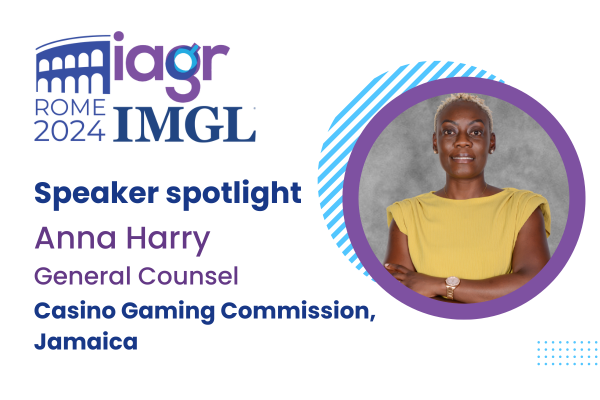
Implementing an effective framework for securing player health in a tourist casino user population – the Jamaican experiment
Guest article by Anna I. Harry, General Counsel, Casino Gaming Commission, Jamaica
Jamaica is a small island developing state in the West Indies whose economy is heavily dependent on tourism and which has, for more than a decade, been trying to augment its tourism product through the introduction of casinos with live table games and live dealing.
At present, there are no casinos in Jamaica; however, it is expected that an application for a casino gaming licence will be submitted to the regulator in the coming months. In the meantime, there are over 5,000 establishments housing nearly 30,000 gaming machines across the island, under the oversight of the Betting, Gaming and Lotteries Commission (BGLC), which governs the licensing, regulation and monitoring of lotteries and all betting on non-casino gaming, pursuant to the Betting, Gaming and Lotteries Act (BGLA).
The current responsible gambling programme, the only one of its kind in the English-speaking Caribbean, consists of a prevention, treatment and training initiative funded by the BGLC and administered by RISE Life Management Services (RISE), a non-governmental organisation which provides skills, education, mentoring and counselling for at-risk populations in communities across Jamaica. In particular, the programme takes the form of:
- Counselling and support services for persons with gambling-related problems
- Prevention education for youth in schools
- Responsible gaming training for gaming lounge staff.
In a study conducted in 2021 on behalf of the BGLC to measure the success of the program, base awareness of responsible gambling messages was assessed at 41% of the sample population. However, while problem gamblers were significantly more likely to report being exposed to messages on responsible gambling, the majority of all respondents (85.9%) were unaware of organizations that offered help to persons struggling with gambling problems.
A more recent follow-up study conducted on a smaller population from January to March 2024 suggested increased awareness of responsible gambling messages (57%).
However, in the Consultation Paper for a separate study commissioned by the BGLC to inform the introduction of guidelines on marketing and advertising of gambling and gambling-related products, some extremely concerning trends were illuminated in relation to the prevalence of gambling among young people and children.
Jamaica’s Casino Gaming Commission (CGC), which has the responsibility under the Casino Gaming Act to regulate casino gaming and safeguard responsible gaming in casinos, recognises that these issues are not unique to Jamaica – there are numerous documented reports of the increasing prevalence of underage gambling in various jurisdictions around the world, especially with the rise in sports betting, as well as regarding gambling as a general public health issue. Indeed, the World Health Organisation has long recognised that the gambling-related burden of harm was 2.5 times more than diabetes and 3.0 times more than drug use disorder and is primarily due to financial impacts, damage to relationships and health, emotional/psychological distress and adverse impacts on work and education, which is disproportionately carried by disadvantaged and marginalised population sectors and contributes to health and social disparities.
The existing body of learning makes the case for deploying diverse research-based methodologies to safeguard player health, and the urgency of invoking collaboration among the broadest base of stakeholders, including the regulator, licensees and other operators in the market, advertisers, and patrons.
These considerations have guided the CGC in building out its regulatory framework; in particular, the CGC has attempted to balance the rights and obligations of patrons and the IRD and casino operator alike, and has tried to craft a responsible gaming framework that:
- Provides patrons with the support they need to make informed decisions about their gaming practices
- Involves both the IRD and casino operator in the work of creating a system that is intended to foster sustainability of the local casino gaming industry
- Allows the casino gaming industry (and the wider gambling industry) in Jamaica to benefit from collaboration with local and international stakeholders
Join Anna Harry, General Counsel of the Casino Gaming Commission on first day of the IAGR and IMGL Rome 2024 Conference on 21 October. Anna will share more about how the CGC contends with fulfilling its mandate to institute measures and controls to facilitate responsible casino gaming within the context of what is expected to be a largely tourist, rather than resident, user population while balancing the competing regulatory and commercial interests. Anna’s session is titled, Implementing an effective responsible gaming framework for a tourist casino user population
Anna Harry is a Legal and Governance Strategist who has practised law in Jamaica for over 15 years. She is currently the General Counsel and Corporate Secretary of Jamaica’s Casino Gaming Commission, and is passionate about leveraging governance as an enabler of strategy and sustainability in both the public and private sectors.





